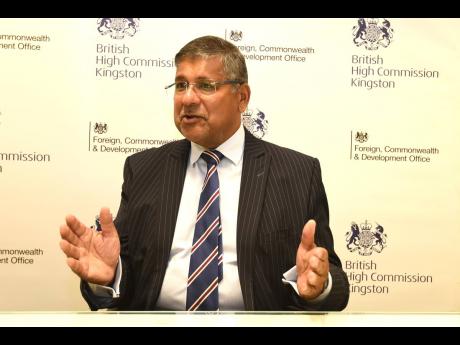UK VAX BAILOUT
The vaccine shortage that has seen Jamaica trailing many of its Caribbean counterparts in per-capita immunisation against COVID-19 will be eased shortly with the Boris Johnson administration poised to announce, in a matter of days, a significant...
The vaccine shortage that has seen Jamaica trailing many of its Caribbean counterparts in per-capita immunisation against COVID-19 will be eased shortly with the Boris Johnson administration poised to announce, in a matter of days, a significant donation from the United Kingdom government.
At present, only five per cent of the Jamaican population has been fully vaccinated.
The Reuters COVID-19 tracker estimates that Barbados has vaccinated about 29.4 per cent of its population, with Trinidad and Tobago at 13.3 per cent, St Vincent and the Grenadines 11.5 per cent, and Grenada 15.7 per cent.
British High Commissioner to Jamaica Asif Ahmad told The Gleaner on Thursday that No. 10 would be making an announcement that would “please every Jamaican”.
Ahmad said that there have been active discussions between Prime Minister Boris Johnson and his Jamaican counterpart, Andrew Holness, regarding the vaccine donation.
“There will be good news soon,” the UK diplomat added, noting that the UK’s support in the fight against COVID would be transformational.
When asked about the proposed British donation of vaccinations, Health and Wellness Minister Dr Christopher Tufton said that discussions between both governments were “encouraging”.
Tufton declined to provide details until the process was complete.
However, he told The Gleaner that “we are the closest we have ever been to securing a fairly significant amount of vaccines”.
Tufton signalled that the anticipated vaccines involved multiple sources and different logistics arrangements. He said that it would also involve an approach to inoculation or vaccination that would “require us pivoting a bit from the approach up to this point, meaning the blitz versus the health centre”.
The health and wellness minister said that his ministry was now working out a plan for a more broad-scale process to achieve significantly higher vaccination numbers over a relatively short period.
“So it would involve more stakeholders being a part of that process, not just from the standpoint of vaccinating the population, but also from the standpoint of administering the vaccines,” he said.
Tufton said that the shift in approach would be announced soon. He gave the assurance that people above 50 and those below 50 years who were waiting to be vaccinated would get the opportunity to do so “relatively soon”.
In June, Johnson had said that his country would start donating vaccines to poorer countries in a matter of weeks.
“As a result of the success of the UK’s vaccine programme, we are now in a position to share some of our surplus doses with those who need them,” Johnson had said.
Ahmad noted that the UK would be supporting the Jamaican Government’s campaign to overcome vaccine hesitancy.
The British high commissioner is of the view that when sufficient vaccines become available locally, an increasing number of Jamaicans will step forward and take the jab.
“No one can avoid the responsibility of the decisions they take themselves because the price they pay is infecting their grandmother and killing them. I can’t put it more bluntly,” said Ahmad, whose tenure ends this summer. He will be replaced by Judith Slater.
Asked to comment on the recent decision by the administration to open the entertainment sector after more than a year of closure, Ahmad said that he understood “what Prime Minister Holness is trying to do here, which is to revive these vital sectors”.
Ahmad said that the challenge faced by the Jamaican Government was similar to the worries of every Cabinet around the world.
“We rely on tourism. We rely on free trade. We rely on visitors. We want to have concerts, sports, like in the recent Euro finals and Wimbledon, and everything else.
“People have not talked about the real suffering of people in Jamaica,” he said, pointing out that many workers across various sectors had lost their jobs.
The high commissioner said that when Jamaica started to slowly open up the travel industry, he and Tourism Minister Edmund Bartlett, along with his team, “created this idea of the COVID-resilient zone”.
Ahmad said that the move had worked well, noting that the protocols in Jamaican hotels were world-class.
“I don’t think that there are many countries where they are demonstrably as good as they are over here, and I have seen that replicated in the restaurants and places I have been to in Jamaica,” he said.
The UK envoy, however, said that the success of the measure was dependent on individual behaviour.
“If people misbehave, their country will pay a price, and the recovery will be slower,” he said.
Ahmad told The Gleaner that the UK Government front-loaded the research into COVID-19 vaccines.
The high commissioner explained that the UK placed orders with AstraZeneca, Johnson & Johnson, and others before the clinical trials had been completed.
“We took a huge gamble in the UK and ordered 400 million doses. The time has now come for us to distribute those vaccines,” he said.

